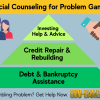Picture this: you’re sitting around a table with your friends, excitement filling the air as you shuffle a deck of cards. Gambling can be thrilling and fun, but have you ever wondered if it could have an impact on your health? Can gambling cause health problems? Let’s dive into this topic and explore the potential risks involved.
Now, I know what you’re thinking. “How can something as thrilling as gambling be harmful to my health?” Well, the truth is, excessive gambling can lead to a variety of health problems. From stress and anxiety to financial strain, the effects can be more far-reaching than you might expect.
But don’t worry, we’re not here to rain on your parade. Our aim is to provide you with a balanced perspective on the topic. So, let’s take a closer look at the potential health risks associated with gambling and how you can enjoy this activity responsibly while taking care of your well-being.
Is Gambling Linked to Health Issues?
While gambling can provide entertainment and excitement, it’s important to be aware of the potential health problems it can cause. Excessive gambling can lead to stress, anxiety, depression, and addiction. It may also adversely affect sleep patterns and lead to financial difficulties. To minimize these risks, it’s crucial to set limits, practice responsible gambling, and seek support if needed. Prioritizing your mental and financial well-being is key when it comes to engaging in gambling activities.

Can Gambling Cause Health Problems?
Gambling is a popular form of entertainment for many people around the world. However, it is important to recognize that excessive gambling can have negative impacts on an individual’s health. This article delves into the potential health problems that can arise as a result of excessive gambling. From mental health issues to physical ailments, we explore the various ways in which gambling can impact a person’s well-being. It is crucial to have a thorough understanding of these potential risks in order to make informed decisions about gambling behaviors.
#The Link Between Gambling and Mental Health
The Psychological Toll of Gambling Addiction
Excessive gambling can lead to the development of gambling addiction, also known as pathological gambling or gambling disorder. This addiction is characterized by an inability to control one’s gambling behaviors despite negative consequences. Individuals with gambling addiction often experience intense cravings to gamble, which can lead to financial problems, strained relationships, and psychological distress.
Increased Risk of Mental Health Disorders
Studies have shown that individuals with gambling addiction have a higher risk of developing mental health disorders such as depression, anxiety, and substance abuse issues. The stress and anxiety associated with excessive gambling can take a toll on a person’s mental well-being. Furthermore, the financial consequences of gambling addiction can lead to feelings of despair and hopelessness, exacerbating these mental health issues.
#The Physical Effects of Excessive Gambling
Insomnia and Sleep Disorders
Excessive gambling can disrupt a person’s sleep patterns, leading to insomnia and other sleep disorders. The constant preoccupation with gambling, coupled with the anxiety and stress that often accompany it, can make it difficult for individuals to relax and fall asleep. This lack of quality sleep can have a detrimental impact on a person’s overall health and well-being.
Increased Risk of Cardiovascular Disease
Research suggests a link between excessive gambling and an increased risk of cardiovascular disease. The stress and anxiety associated with gambling can elevate blood pressure and heart rate, putting individuals at a higher risk for conditions such as hypertension, heart attacks, and strokes. Additionally, the financial strain resulting from gambling addiction can lead to poor lifestyle choices, such as unhealthy eating habits and lack of exercise, further exacerbating the risk of cardiovascular problems.
Impact on Physical Appearance and Self-Care
Individuals with gambling addiction may neglect their physical appearance and self-care due to their preoccupation with gambling. They may prioritize gambling activities over proper nutrition, exercise, and personal hygiene. This can lead to a deterioration of physical health and hygiene, contributing to a decline in overall well-being. It is important to address these physical effects in order to improve the quality of life for individuals struggling with gambling addiction.
#The Role of Treatment and Support
Seeking Professional Help
If you or someone you know is experiencing health problems due to gambling addiction, it is crucial to seek professional help. Various treatment options, such as therapy, support groups, and medication, are available to help individuals overcome gambling addiction and address the associated health issues. Consulting with a healthcare professional or addiction counselor can provide guidance on the most suitable treatment approach.
Building a Support System
Having a strong support system is essential for individuals struggling with gambling addiction. Friends, family members, and support groups can provide the necessary emotional support and encouragement throughout the recovery process. It is important to surround oneself with individuals who understand the challenges of gambling addiction and can offer non-judgmental support.
Taking Steps Towards Recovery
Recovering from gambling addiction requires taking proactive steps towards change. This may include setting financial limits, avoiding triggers, and developing healthier coping mechanisms. It is important to remember that recovery is a process and may involve setbacks along the way. With the right support and dedication, individuals can overcome the health problems associated with gambling addiction and lead fulfilling lives.
In conclusion, excessive gambling can indeed cause health problems, both mental and physical. From the psychological toll of gambling addiction to the physical impact on sleep patterns, cardiovascular health, and self-care, it is evident that gambling can have detrimental effects on an individual’s well-being. Recognizing the potential risks and seeking appropriate treatment and support is crucial in addressing these health problems and finding a path towards recovery.
Key Takeaways: Can Gambling Cause Health Problems?
- Gambling can lead to stress and anxiety.
- Excessive gambling can result in financial problems and debt.
- Problem gambling can negatively impact relationships with family and friends.
- Gambling addiction can lead to depression and other mental health issues.
- Engaging in gambling activities for extended periods can cause physical health problems like sleep disorders and lack of self-care.
Frequently Asked Questions
Welcome to our Frequently Asked Questions section about the potential health problems associated with gambling.
What are some potential health problems that can be caused by gambling?
Gambling can lead to a number of health problems, both physical and mental. Some common physical health issues include stress-related illnesses, high blood pressure, obesity, and sleep disorders. On the mental health side, gambling addiction can lead to anxiety, depression, and even thoughts of suicide. Additionally, excessive gambling can cause financial distress, which can in turn lead to further stress and mental health problems.
It’s important to note that not everyone who gambles will experience these health problems, and the severity of the problems can vary from person to person. However, when gambling becomes a compulsive behavior and starts interfering with other aspects of a person’s life, the risks of developing health issues increase.
Can gambling have an impact on a person’s personal relationships?
Yes, gambling can have a significant impact on a person’s personal relationships. Excessive gambling and gambling addiction can strain relationships with family, friends, and romantic partners. The financial strain caused by gambling losses, as well as the emotional and psychological toll of addiction, can lead to trust issues, communication breakdowns, and feelings of resentment. This can result in damaged relationships, isolation, and social withdrawal.
Furthermore, the behaviors often associated with problem gambling, such as lying, hiding the extent of their gambling activities, and prioritizing gambling over spending time with loved ones, can strain relationships and erode trust. It is important for individuals struggling with gambling addiction to seek help not only for their own health but also to protect and repair their relationships.
Is gambling addiction a recognized mental health disorder?
Yes, gambling addiction, also known as pathological gambling or gambling disorder, is recognized as a mental health disorder. In the fifth edition of the Diagnostic and Statistical Manual of Mental Disorders (DSM-5), gambling disorder is classified as an addictive disorder. It is characterized by persistent and recurrent problematic gambling behavior that leads to clinically significant impairment or distress. Individuals with gambling disorder often experience an intense urge to gamble, difficulty controlling or stopping the behavior, and continued gambling despite negative consequences.
Gambling disorder can have severe consequences for a person’s life, including financial difficulties, legal problems, and strained relationships. It is important for individuals struggling with gambling addiction to seek professional help and support to address the underlying issues and develop healthier coping mechanisms.
Can gambling have an impact on mental well-being?
Yes, gambling can have a significant impact on mental well-being. For some individuals, gambling can provide a temporary escape or a way to cope with stress or negative emotions. However, for others, gambling can turn into a compulsive behavior that exacerbates existing mental health issues or leads to the development of new ones.
Gambling addiction can contribute to or worsen conditions such as depression, anxiety, and substance abuse. The financial and emotional consequences of gambling can cause immense stress, leading to feelings of guilt, shame, and hopelessness. It’s important to prioritize mental well-being and seek help if gambling is negatively impacting mental health.
Are there support services available for individuals struggling with gambling addiction?
Yes, there are support services available for individuals struggling with gambling addiction. Many countries have helplines and online resources specifically dedicated to providing support, information, and treatment options for gambling addiction.
Counseling and therapy can be beneficial for individuals seeking to address their gambling addiction and its underlying causes. Support groups, such as Gamblers Anonymous, can also provide a helpful network of individuals who have experienced similar struggles and can offer support and encouragement throughout the recovery process. It’s important to reach out for help and not face gambling addiction alone.
Can a drug be responsible for compulsive gambling?
Summary
Gambling can cause health problems, both physically and mentally. It can lead to stress, anxiety, and even depression. Additionally, excessive gambling can result in financial difficulties and strained relationships.
It is important to recognize the signs of problem gambling and seek help if needed. Talking to a trusted adult or contacting helplines can provide support and assistance. Remember, it’s okay to ask for help when facing gambling-related health issues.









